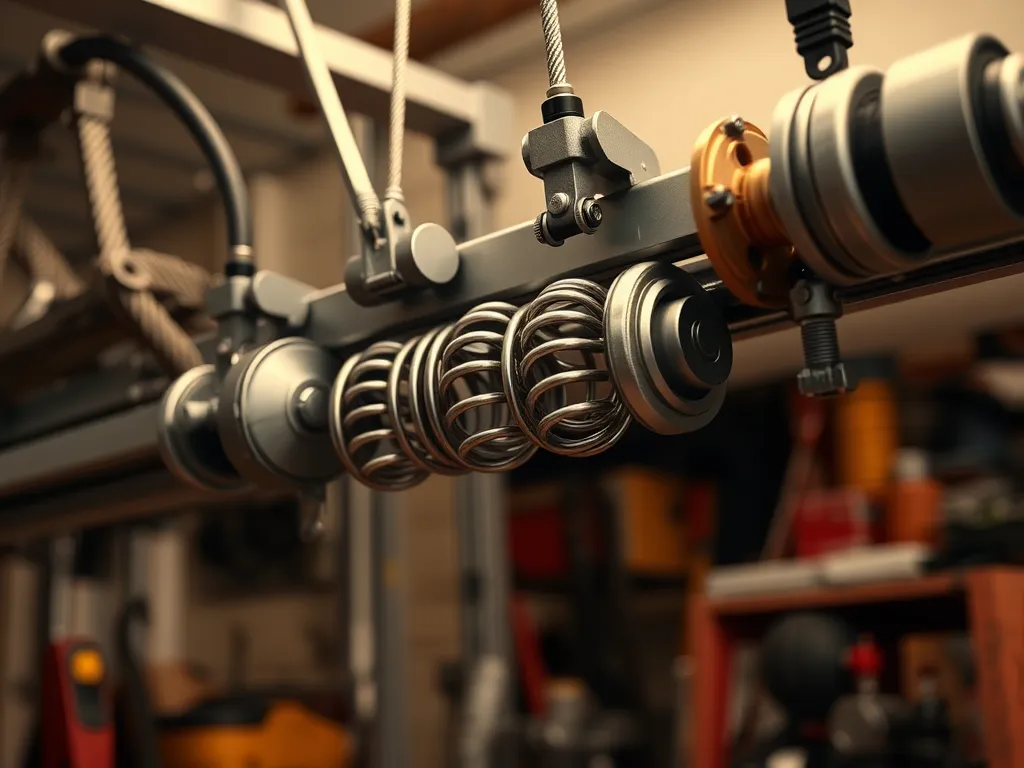Master Professional Techniques for Balancing Garage Door Tension

The Complete Guide to Garage Door Maintenance
Garage Door Maintenance is a crucial aspect of homeownership that often goes overlooked. Regular maintenance not only ensures the longevity of your garage door but also enhances its performance and safety. A well-maintained garage door can prevent accidents, save you money on repairs, and provide peace of mind.
Understanding the components of Garage Door Maintenance is essential for homeowners. This includes checking the door's mechanical parts, ensuring the door is balanced, and addressing any wear and tear on the door itself. By keeping these elements in check, you can avoid more significant issues down the line and keep your garage door functioning smoothly.
Mastering professional balancing techniques ensures that garage doors operate smoothly and efficiently.
One of the critical areas in Garage Door Maintenance is the tension system. The tension in the garage door springs is vital for the proper operation of the door. Over time, wear and tear can throw the tension off balance, leading to various problems that can jeopardize the door's functionality. Properly maintaining the tension system can prevent these issues and extend the life of your garage door.
Regular inspections and maintenance can make a significant difference in the performance of your garage door. It's recommended to schedule these checks at least twice a year, which includes examining the door tracks, rollers, cables, and electrical components. Additionally, ensuring that your garage door opener is functioning correctly is another vital part of Garage Door Maintenance that should not be ignored.
Effective door calibration can significantly enhance your garage door's performance and longevity.
In conclusion, Garage Door Maintenance is an essential task for homeowners. By taking the time to understand and perform regular maintenance, you can enhance the safety, functionality, and longevity of your garage door. Don't wait for a problem to occur; instead, be proactive about your garage door care.
Understanding Garage Door Tension
Proper tension in a garage door is critical for its smooth operation. The garage door tension springs play a significant role in balancing the weight of the door, making it easy to open and close. If the tension is too high or too low, it can lead to operational problems and even safety hazards.
There are two main types of garage door tension systems: extension springs and torsion springs. Extension springs are located above the upper tracks and stretch to lift the door. Torsion springs are mounted above the closed door and work by twisting to lift the door. Both types require regular maintenance to ensure they operate correctly.
Regular spring adjustment is vital for maintaining the safety and functionality of your garage door system.
Common issues caused by improper tension include uneven door movement, excessive noise during operation, and the door failing to open or close completely. If left unaddressed, these issues can lead to premature wear on the garage door and its components, necessitating more costly repairs.
Professional Techniques for Balancing Tension
To balance garage door tension effectively, several tools are required, including a socket wrench set, pliers, a tape measure, and a level. These tools help to adjust the springs and assess the balance of the door accurately.
Balancing garage door tension involves a step-by-step process: First, you need to disconnect the garage door opener and manually lift the door halfway. If it stays in place, the tension is balanced. If it drops or rises, you'll need to adjust the springs accordingly. Depending on whether you're tightening or loosening the springs, you will need different adjustments on each side to ensure balance.
Safety precautions during balancing include wearing safety goggles, ensuring the area is clear of bystanders, and using clamps to secure the door during adjustments. Because the tension in the springs is significant, improper handling can lead to injury.
Signs of Imbalance in Garage Doors
Identifying signs of tension imbalance in garage doors is crucial. Symptoms include the door being hard to open, unusual noises during operation, and the door not fully closing or opening. Observing these signs early on can prevent more serious issues later.
The impact of imbalance on garage door functionality can be significant. An imbalanced door can wear out the opener and other components more quickly, leading to costly repairs and replacements. Moreover, an improperly functioning door can pose safety hazards to you and your family.
If you notice symptoms of imbalance, it’s advisable to call a professional for help. Attempting to fix significant imbalance issues without expert knowledge can lead to accidents or further damage to the door and its components.
Maintenance Tips for Garage Door Tension
Regular checks and adjustments of the garage door tension system should be part of your routine maintenance. Ideally, inspect the tension springs for wear and signs of damage every few months. Make adjustments as necessary to maintain an even balance.
Lubrication techniques are vital for the longevity of your garage door components. Use a high-quality garage door lubricant on the springs, hinges, and tracks to reduce friction and wear. This should be done at least twice a year to ensure smooth operation.
Seasonal maintenance considerations include checking the garage door after extreme weather changes. Cold temperatures can affect the performance of the springs, while humidity may lead to rusting. Always inspect the door before and after winter and summer seasons for optimal performance.
DIY vs. Professional Help for Tension Balancing
Hiring a professional service for garage door tension balancing comes with several benefits, including access to expert knowledge, professional-grade tools, and safety assurances. Professionals can quickly identify issues and ensure proper adjustments are made without risking injury.
The cost comparison of DIY and professional services often swings in favor of DIY, but it can be deceptive. While DIY projects may seem cheaper, the risk of errors and potential injuries can lead to higher costs in the long run if professional help is needed afterward.
When choosing a reliable garage door technician, consider factors such as experience, reviews, availability, and pricing. Always ask for quotes and ensure they provide warranties on their work. This ensures you are getting quality service and can have peace of mind.
